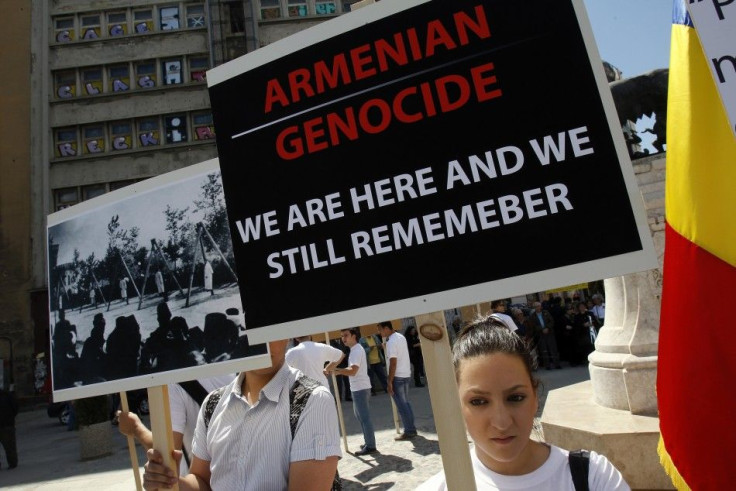Armenians Commemorate 97th Anniversary Of Genocide

Armenians around the world are observing the 97th anniversary of the genocide of their people that took place in Ottoman Turkey during World War I.
According to historical accounts, on April 24, 1915, the ruling party of the Ottoman Empire, the Young Turks, ordered the murder of Armenian intellectuals, leaders, artists and businessmen living in the empire. That order led to the deportation and killings of untold numbers of Armenians and others.
Between 1.5 million and 2 million Armenians are believed to have been massacred in 1915-1918 amidst the chaos and disintegration of the Ottoman Empire. Armenian Christians were suspected of being loyal to Russia instead of Muslim Turkey.
If these numbers are accurate, about half of the total Armenian population was wiped out in just three years.
The massacres may have also helped Adolf Hitler believe he could get away with exterminating the Jews and others during the Holocaust during the following world war. Prior to invading Poland in 1939, Hitler reportedly declared: Who, after all, speaks today of the annihilation of the Armenians?
The Turkish government has always denied that the murders were a state-sanctioned genocide and claimed that the actual number of deaths was far less -- perhaps between 300,000 and 500,000. The Turks claim that Armenians who perished were simply the victims of war.
Yerevan Remembers Those Lost
In Yerevan, the capital of the modern state of Armenia, thousands marked the tragedy in a procession, carrying candles and laying flowers at an eternal flame in the middle of a genocide monument.
Today we, just as many, many others all over the world, bow to the memory of the innocent victims of the Armenian genocide, said President Serzh Sarkisian, who laid wreaths at the monument.
This day is one of those moments when the entire nation rallies around the unification of our homeland.”
An elderly mourner, 75-year-old Tsovinar Tumasian, told Agence France-Presse that Turkey must take responsibility for the mass murders of Armenians.
If they are not forced to do so, they will not recognize the genocide as fact. They think that with time, everyone will forget about it, she said.
The night before the commemoration, 8,000 members of the youth brigade of the nationalist Dashnaktsutyun party staged a march in Yerevan which culminated with the burning of a Turkish flag.
Our action is a protest, a cry of indignation, a student named Hamayak Serobian told AFP, adding that the Turks must acknowledge the brutality of their ancestors.
According to Panorama.am, an Armenian news agency, the ambassadors of the United States and Germany, John Heffern and Hans-Jochen Schmidt, also paid their respects to the Armenians who died almost a century ago in a ceremony in Yerevan.
The Russian pro-consul in Armenia, Vasily Korchmar, told reporters: “Genocide is very awful phenomenon when everybody is murdered – old people, women, children. It is unforgettable. We grieve with Armenian people. Genocide is the tragedy not only of Armenians but also of the whole humanity. Only God has the right to dispose human lives.”
At a genocide observation ceremony in Moscow, the Armenian ambassador to Russia, Oleg Yesayan, stated: “Armenians worldwide are bowing their heads in memory of 1.5 million of genocide victims. For 97 years, Armenians have been struggling for recognition of the crime against humanity, and will continue the struggle to achieve acknowledgement of the genocide. This is the sacred debt of our people to those who were massacred along with our motherland and culture.”
Yesayan then condemned Turkey for its refusal to acknowledge the mass murders.
“Every year, Turkey sees increased number of genocide recognition supporters. When the past is pressuring the present, the future becomes unforeseeable. This is why Turkey, even more than Armenia, needs genocide recognition.”
The characterization of the mass murders as “genocide” has become a political firecracker for nations that do not want to alienate Turkey, a rising economic power in West Asia. Already a move by French President Nicolas Sarkozy to criminalize the denial of the Armenian genocide sparked a diplomatic row between Paris and Ankara.
Panorama reported that only about 30 nations -- including Russia, Greece, Germany and Canada – have officially recognized and condemned the Armenian Genocide. The Vatican and the European Parliament have also accepted the killings as genocide.
U.S. Stance
The United States is one prominent holdout.
Indeed, during the fourth annual Armenian Remembrance Day, President Barack Obama again did not use the word “genocide,” in contrast to statements he had made while serving as Illinois senator and running for the White House.
“America deserves a leader who speaks truthfully about the Armenian Genocide and responds forcefully to all genocides,” he said a few years ago. “I intend to be that president.”
Obama also wrote a letter in January 2008 to the Armenian Reporter journal in which he said he “shared with Armenian Americans -- so many of whom are descended from genocide survivors -- a principled commitment to commemorating and ending genocide. That starts with acknowledging the tragic instances of genocide in world history.”
The Armenian Assembly of America has urged Obama to officially recognize the 1915-1918 killings as genocide and to condemn Turkey for its actions.
As we mark the anniversary of the [Nazi] Holocaust, the Armenian Assembly of America stands in solidarity with the Jewish people by remembering the victims, paying tribute to the survivors and rededicating ourselves to genocide affirmation, education and prevention, said Assembly Executive Director Bryan Ardouny.
Not all Turks have denied culpability in the massacres from so long ago.
Turkish academic Taner Akçam, a professor at Clark University in Massachusetts, has authored a number of books about the tragedy, including The Young Turks’ Crime Against Humanity: The Armenian Genocide and Ethnic Cleansing in the Ottoman Empire, and A Shameful Act: Armenian Genocide and the Question of Turkish Responsibility.
© Copyright IBTimes 2024. All rights reserved.





















